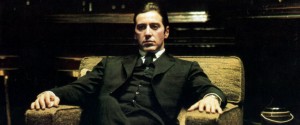Last week I watched the first two Godfather films with one of my sons, and I was struck again at the brilliance of these movies, both as works of cinematic art and for their insightful themes about human nature, especially regarding moral psychology. So here I am going to highlight three of the more significant “lessons” from the Godfather I and II. I will assume that you have already seen both of these films. (If you haven’t done so, then in the name of aesthetic excellence, please do so as soon as possible!)
The first lesson is this: human beings are capable of rationalizing even the worst forms of wickedness. In the Godfather films, Vito, Michael and other members of the Corleone mafia family consistently refer to their illegal activities, including their most gruesome hits on various enemies, as “business.” This handy euphemism enables  them to see all of their murders as somehow legitimate. As bizarre and alien as this might seem to us as viewers, it is important to remember that this only differs in degree, not kind, from rationalizations of which we are all guilty. We may not glibly refer to murder as “business,” but we might reconceive our arrogance as “self-confidence,” minimize our inconsiderateness as “competitiveness,” or dismiss our temper tantrums as “venting stress.”
them to see all of their murders as somehow legitimate. As bizarre and alien as this might seem to us as viewers, it is important to remember that this only differs in degree, not kind, from rationalizations of which we are all guilty. We may not glibly refer to murder as “business,” but we might reconceive our arrogance as “self-confidence,” minimize our inconsiderateness as “competitiveness,” or dismiss our temper tantrums as “venting stress.”
Another important reminder from the Godfather films is that even the best of us is vulnerable to corruption, given the right circumstances. At the start of the film, Vito’s son Michael is the only innocent adult male in the Corleone family. A recent war veteran, Michael is an honorable young man—brave, respectful, self-controlled, and principled. With such virtue, how could he ever be corrupted? Well, when your father is gunned down and you see your family suffering severely as a result, this can tempt anyone to revenge. And, of course, Michael succumbs in dramatic and protracted fashion. Perhaps the only reason you and I have not followed the path of Michael Corleone is—thank God—we’ve never been put in those same circumstances.
Thirdly, some of the most powerful temptations to evil are those which invite us to achieve good consequences. It was Michael’s love for his family and his sense of justice that prompted his outrage at the assassination attempt on his father. And it was this outrage which was the doorway to his corruption. Thus, while the usual temptations to power and wealth were insufficient to turn Michael to the dark side, a reasonable desire to see a wrong made right was sufficient. This serves as a powerful reminder that we are never so virtuous as to be out of the reach of evil, for even our strongest virtues can be leverage points for the most severe moral failures.
The story in the Godfather serves as a cautionary tale about the universal human potential for extreme wickedness. In many ways, the films realistically highlight a significant, if painfully dark, aspect of human nature and the need to guard ourselves in light of this. It is a theme succinctly expressed by the Lord himself in his famous remark to Cain—a man who, like Michael Corleone, faced temptation to murder and who likewise succumbed: “Sin is crouching at your door; it desires to have you. But you must rule over it” (Genesis 4:7). Amen and Amen.

bethyada
Thus, while the usual temptations to power and wealth were insufficient to turn Michael to the dark side, a reasonable desire to see a wrong made right was sufficient.
Yes, the story of Absalom.